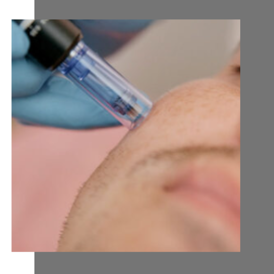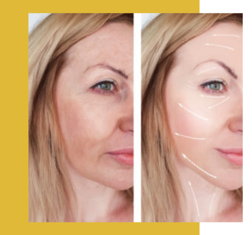

About:
Microneedling is a cosmetic procedure that involves puncturing the skin with tiny needles to stimulate collagen and elastin production and can be combined with serums, PRP, or other treatments.
Reduces the appearance of fine lines, wrinkles, and scar Improves skin texture and tone Increases collagen and elastin production Boosts circulation and lymphatic drainage Enhances absorption of topical products Safe for all skin types and colors Minimal downtime and recovery Can be customized to target specific skin concerns Long-lasting results with regular treatments.
Microneedling stimulates the production of collagen and elastin fibers in the skin, resulting in firmer, smoother, and more youthful-looking skin. Improves skin texture and reduces the appearance of fine lines, wrinkles, acne scars, and other skin imperfections. Microneedling creates tiny microchannels in the skin, which allows topical products to penetrate deeper and work more effectively. Can be effective in reducing the appearance of dark spots and hyperpigmentation by promoting skin cell turnover. Microneedling can be used on the scalp to stimulate hair growth by increasing blood flow and cell regeneration in the hair follicles.
Q&A:
- What is microneedling? Microneedling or collagen induction therapy is a minimally invasive skin rejuvenation treatment that involves the use of tiny needles to create small micro-injuries in the skin. This process stimulates the body to produce new collagen and elastin, which results in firmer, smoother, and more even skin.
- How does microneedling work? Microneedling works by creating small micro-injuries in the skin, which triggers the body’s natural healing process. The body responds by producing new collagen and elastin, which makes the skin firmer, smoother, and more even. Microneedling also enhances the absorption and effectiveness of topical skincare products. What are the benefits of microneedling? Microneedling helps to reduce the appearance of fine lines, wrinkles, and acne scars, improve skin texture and firmness, and even out skin tone. It can also improve the effectiveness of topical skincare products and enhance their absorption.
- Is microneedling safe? Yes, microneedling is a safe and effective skincare treatment. However, it is important to choose a qualified and experienced practitioner and follow proper aftercare instructions to minimize the risk of complications.
- Does microneedling hurt? Microneedling may cause some discomfort, but most people find it tolerable. A topical numbing cream can be applied before the treatment to ease any discomfort.
- How many microneedling treatments are needed? The number of microneedling treatments needed depends on the individual’s skin concerns and their response to the treatment. Most people require a series of 3-6 treatments, spaced 4-6 weeks apart, to achieve optimal results.
- What is the downtime after microneedling? The downtime after microneedling is minimal. After the treatment, the skin may be slightly red and sensitive, but this usually resolves within 24-48 hours. It is important to avoid sun exposure and apply sunscreen after the treatment to protect the skin during the healing process.
- Who is a good candidate for microneedling? Microneedling is suitable for most skin types and can benefit anyone looking to improve the appearance of fine lines and wrinkles, acne scars, uneven skin tone, or texture. However, it may not be suitable for individuals with active acne or certain medical conditions. It is always recommended to consult with a qualified practitioner to determine if microneedling is right for you.
After Care:
Avoid direct sunlight for a few days after the procedure and wear sunscreen if you need to be outside.
Keep your face clean and don’t apply any makeup or skincare products for at least a few hours after the procedure.
Apply a soothing cream or serum to reduce redness and inflammation.
Avoid hot showers, saunas, and exercise for at least 24 hours after the procedure.
Do not pick at any flaky skin that may form post-procedure.
Use gentle cleansers and moisturizers to keep your skin hydrated and healthy.
Resume your regular skincare routine after 48-72 hours or as indicated by your specialist.

